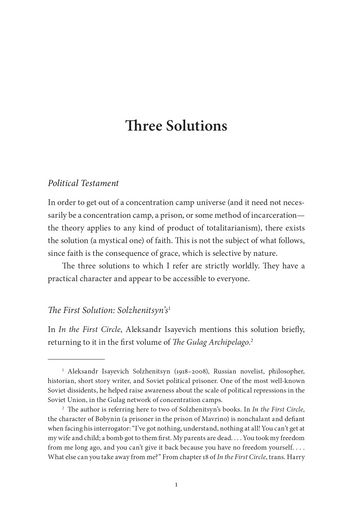ISBN:978-0-88141-707-4, 9780881417074
This publication represents the officially authorized translation of The Journal of Joy, carefully rendered to uphold the integrity of the original text in Romanian.
The ethos Steinhardt recommends to Christians is that of an aristocrat minus the stiff upper lip and aloofness, a style molded by kindness, calm, good manners, respect for the dignity of others, and thus for one's own dignity. Christ Himself, he emphasizes, always possessed ‘knightly’ traits: He is discreet, respectful; He knocks on the door and waits, never discouraged by a refusal; He is not suspicious but trusts, not greedy but gives abundantly; He forgives easily and completely; He is attentive and polite (‘Friend,’ He says to Judas, whose betrayal He knows well). In Him, there is no moralism or legalism, but rather the ability to discern in every person, beyond sin, the person that God calls and enables to love. Beyond totalitarianism, which is the fascination with power and death, and beyond market society, which holds up profit as its only god … If the journal of this resistance opens up for the future, it does so precisely because it is a Journal of Joy.
Olivier Clément, from the Preface to the French edition of the Journal of Joy
This is the Journal of Joy, a joy founded on the Resurrection, unconquerable by the manifest powers of death. Now at last available in English, its joy can help transform the petty anxieties that beset us.
Archpriest Andrew Louth, Professor Emeritus, Durham University
Translation by Paul Boboc, revised by Peter Andronache, with further revisions and explanatory notes by Peter Andronache, Bogdan G. Bucur, Nicolae Drăgușin, Brenda Mikitish, and Răzvan Porumb. Foreword by Răzvan Porumb.
About the Author:
Nicu Steinhardt, known in his later monastic years as Father Nicolae de la Rohia, was born in 1912 near Bucharest to Jewish parents. A refined scholar who had established himself as one of the most erudite voices of his generation, he was imprisoned by the repressive communist regime in 1960. Steinhardt asked to be baptized in his cell—“illicitly”—and eventually found profound joy amid the suffering and despair of the prison. After an extraordinary experience of Christ, the intense happiness accompanying him perpetually transfigured the cruel and gloomy surroundings into a luminous world permeated by God’s love and grace—which is why writing the Journal in the early 1970s was essential, even in the knowledge it would be banned by the communists. Nicolae Steinhardt, then a monk at Rohia, passed away in March 1989, nine months before the 1989 December Revolution toppled the communist dictatorship.














